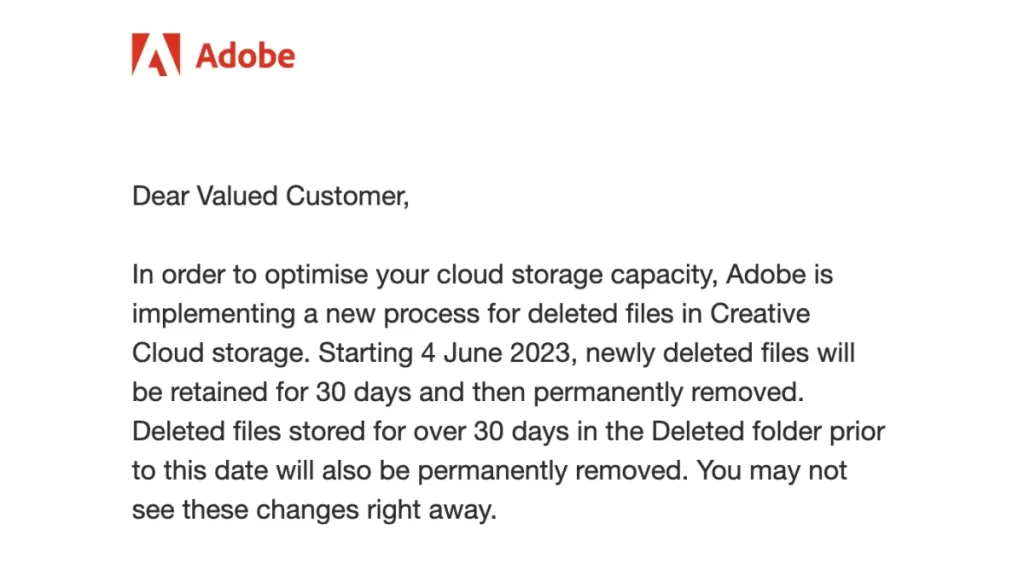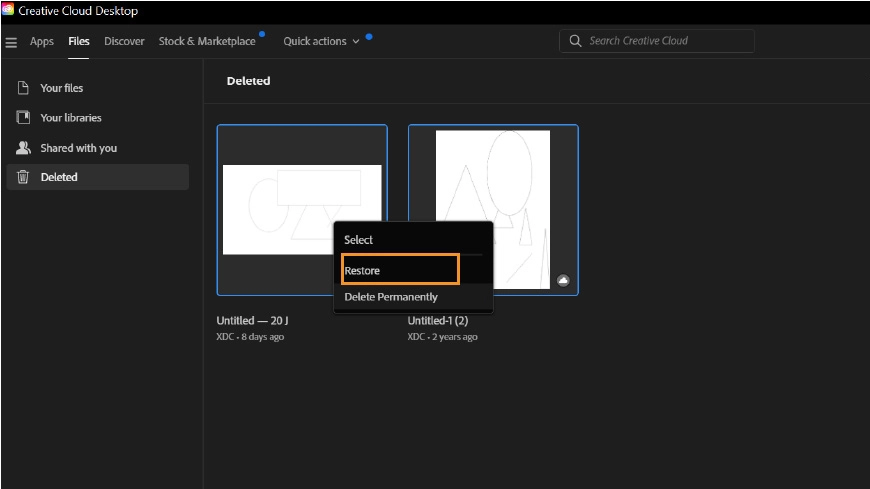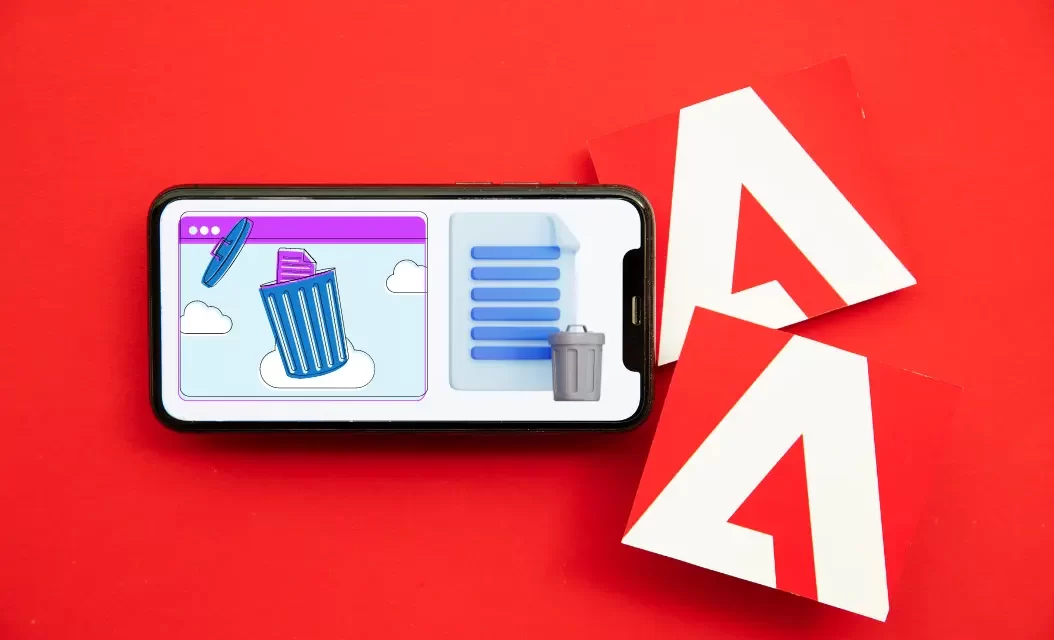Adobe trash update removes your embarrassing selfies are gone for good.
Adobe has recently announced that they will delete users’ trash files, getting rid of those embarrassing selfies and other unwanted files for good. This new feature is a welcome move for those who may have accidentally saved files they no longer want to keep or for those who want to improve their data privacy and security.

Photo courtesy of Adobe
Adobe has updated its policy on automatically deleting your old files. The Adobe trash update states that Adobe will no longer automatically delete your old files without your permission. This change was made in response to customer feedback, who expressed concerns about the previous policy.
Under the old policy, Adobe would automatically delete your old files after a specific time, even if you had not explicitly deleted them. This could cause trouble if you have essential files you need to keep and remember.
After a recent update to the Creative Cloud app, Adobe added the ability to delete items from the trash. In the past, deleted files would stay in a user’s trash folder, taking up room and possibly risking the user’s privacy. Users can now have their trash immediately emptied, ensuring that their old files are gone for good.
Adobe Lightroom CC has been removing old pictures from your trash after 60 days for a while now, and it looks like that will continue. This will only affect Creative Cloud files.
The new policy gives you more control over your files. You can keep your old files indefinitely or delete them manually when you no longer need them. Knowing that your important files are safe and secure gives you peace of mind.
You can contact Adobe customer support if you have questions about the new policy. They will gladly help you understand the new policy and answer any questions.
Here are some additional details about the Adobe trash update:
- It will no longer automatically delete your old files without your permission.
- You can keep your old files indefinitely or delete them manually when you no longer need them.
- You can contact Adobe customer support if you have questions about the new policy.
FAQs about the update
Information about Adobe’s new policy on automatically deleting your old files:
- What is the new policy?
Adobe has updated its policy on automatically deleting your old Creative Cloud files. The Adobe trash update states that Adobe will automatically delete your Creative Cloud files after 30 days. This change from the previous policy allowed Adobe to keep your deleted files for up to 90 days.
- Why did Adobe change the policy?
Adobe changed the policy in response to customer feedback. Many customers were concerned about the privacy of their deleted files. Under the old policy, Adobe could sell or share your deleted files with third-party companies. The new procedure eliminates this risk, as your deleted files will be forever deleted after 30 days.
- What happens to my deleted files now?
If you delete a file from your Creative Cloud account, it will be moved to the “Deleted Items” folder. The file will remain in the “Deleted Items” folder for 30 days. After 30 days, the file will be permanently deleted.
- Can I still delete my deleted files manually?
Yes, you can still delete your deleted files manually. The “Deleted Items” folder can be accessed from the “Files” tab within the Creative Cloud program. You can choose the things you want to eliminate and click the “Delete” button.
- Do I need to know anything else?
The Adobe trash update is a step in the right direction for Adobe. This demonstrates that the corporation values its customers’ privacy. If you use Creative Cloud, you can rest assured that your deleted files will be deleted permanently after 30 days.

Photo courtesy of Adobe
When did it start?
The new policy on automatically deleting your old files started on February 21, 2023. Under the new policy, it will automatically delete your Creative Cloud files after 30 days. This change from the previous approach allowed Adobe to keep your deleted files for up to 90 days.
If you have any concerns about your privacy, you can always choose to delete your deleted files manually.
Advantages and Disadvantages of Adobe trash updates on automatically deleting your old files:
Advantages:
- Increased privacy: Under the new policy, Adobe will no longer store your deleted files for up to 90 days. This means there is less chance that unauthorized people can access your deleted files.
- Less clutter: With the new policy, you don’t have to delete your old files manually. This can save you time and hassle.
- Peace of mind: Knowing that your deleted files will be deleted permanently can give you peace of mind.
Disadvantages:
- If you accidentally delete a file, you may be unable to recover it.
- Remember to move a file to a different location if you need to keep a file for a long time.
- The new policy may not be enough to protect your privacy from sophisticated hackers.
The Adobe trash update gives users peace of mind but can also help them get more done. Users can free up room and make their computers run better by taking files out of the trash folder that isn’t needed. This can be especially helpful for artists with big files, like videos or graphics.
Some people don’t want to delete their trash files. What if they delete something by chance that they want to keep? Adobe has made it easy for users to regain the files they removed. Thanks to the trash folder, users have 30 days to restore any files they might have accidentally erased.
Final Thoughts
Overall, Adobe trash update is good news for people who may have saved embarrassing selfies or other personal files they no longer want to keep. As a trusted software company, Adobe knows how important it is to keep data private and safe. This new move shows how much it cares about protecting the personal information of its users. With Adobe’s trash deletion tool, users can rest easy knowing that their unwanted files are gone for good. It gives them peace of mind and control over their digital lives.













